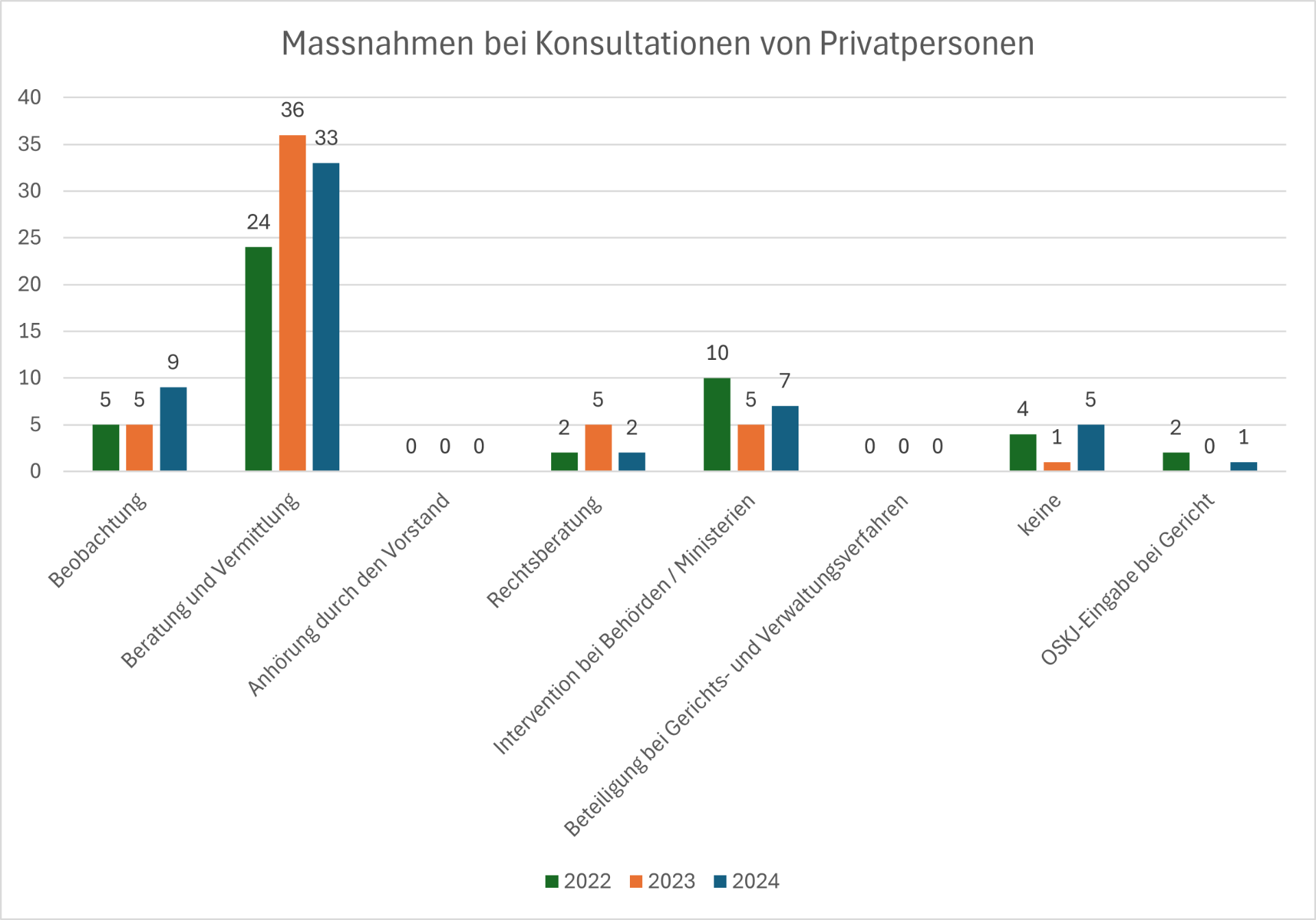Activities
Access to justice - free advice
Everyone, regardless of origin, social status or financial means, must be able to assert their rights and protect themselves against injustice. This requires low-threshold and free access to social and legal advice. Without this, many rights only exist on paper and do not become effective in practice. The VMR offers free advice and initial legal advice for everyone.
In 2024, the VMR was consulted by a total of 57 people. Of these, 24 people were referred to the Ombudsman's Office for Children and Young People (OSKJ). One consultation was handled by the Disability Monitoring Office (MOBE). All contacts are checked for human rights violations. Advice and mediation was offered in 32 cases. In 7 cases, the MOBE and the OSKJ intervened with the competent authorities. In 3 cases, initial legal advice was offered free of charge. In 10 cases, the situation was monitored further. In 5 cases, no action was desired or necessary. The OSKJ also filed a petition with the court.

People come to the Ombudsperson Board with various concerns. The following three examples from our advisory practice show what the problems are and how the Ombudsperson Board can provide support:
Case study 1:
Unequal pay despite equal qualifications - the fight for equality in professional lifeMs. Meier* contacts the VMR because, as a teacher, she earns less than her colleague who has the same qualifications but has been employed for less time. This is contrary to the Gender Equality Act. The VMR encourages her to discuss the issue with her line manager and, if no solution is found, to contact the staff association of the provincial administration or the employees' association. If no solution is found, a complaint can be made to the government.
Family between borders - when residence law separates families
Mrs. Milovic* from Croatia* lives in Liechtenstein with her two children. Her husband and the father of her children live in Buchs. She turns to the Ombudsman because her husband has not been granted a residence permit in Liechtenstein and is therefore violating her right to a family. The VMR clarifies the legal basis and the decisions of the authorities. It shows that the Passport Office has decided in accordance with the law. Nevertheless, the Advisory Council sees a human rights problem here: the Foreign Nationals Act is restrictive when it comes to family reunification. There is also no hardship rule when children are involved. Unfortunately, Liechtenstein made a reservation in this regard when it acceded to the Convention on the Rights of the Child. This is why the VMR has been calling for a hardship rule in the Foreign Nationals Act and a withdrawal of the reservation in its monitoring report for years. Because only if the law is changed can the right to a family be enforced for the Milovic family.
An apprenticeship for Nadja - when family problems jeopardize her career start
Mr. Beck* turns to the OSKJ. He is worried about his niece Nadja*. Nadja is in 3rd secondary school and would soon like to do an apprenticeship. As Nadja has a learning disability, she needs support when starting her career. Nadja's parents live apart. Her mother is ill and can't help her. Her father lives abroad. He is not well informed about Nadja's situation. Nadja would like to lead an independent life, but she cannot manage the search for an apprenticeship on her own. The OSKJ contacts the school and Nadja's father. She manages to get the father to work with the school to find an apprenticeship. In the meantime, Nadja has already been able to do various trial apprenticeships and take her first steps on the road to a career.
*Names and references changed
Litigation with impact - more case law on human rights
There is very little case law on human rights in Liechtenstein. This is due to the fact that the country has roughly the same number of legal norms as other European countries, but far fewer inhabitants who can enforce them. In addition, particularly vulnerable people in Liechtenstein are reluctant to file a lawsuit. This is sometimes for financial reasons. However, they often lack the courage or energy to go through with a legal case. The fear of attention or possible disadvantages also prevents those affected from doing so. As a result, many human rights cannot be enforced. This is because a court ruling not only helps the individual, but also helps to ensure that the legal provisions are interpreted and construed by the court. This benefits everyone who is struggling with similar problems.
This is why the VMR launched the "Pro Human Rights - Effective Litigation" project in 2024. The VMR conducts the legal process together or on behalf of those affected. It bears the legal costs, organizes the legal process, advocates for the human rights concerns of those affected and protects them from possible disadvantages. In this way, it strengthens their access to justice and contributes to the creation of more case law on human rights. Even if a human rights issue is not brought before a court, the VMR's initial legal advice is free of charge.
Your donation counts!
Help us to make human rights more effective. Support our legal advice and our strategic litigation project. So that more human rights violations end up in court and there is more case law on human rights.

Bank details
LLB Vaduz
LI81 0880 0551 4633 6200 1
Intended use: "Legal advice and legal costs"

